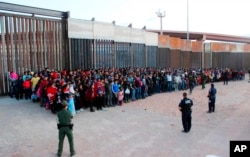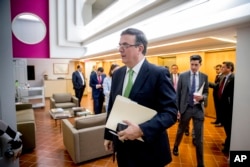Wayne Lee contributed to this report
WASHINGTON — The United States still plans to make good on a threat to impose 5% tariffs on Mexican goods Monday, despite progress in border security negotiations that entered their third day on Friday.
White House spokeswoman Sara Sanders said Friday U.S. and Mexican negotiators have "made a lot of progress over the course of the last few days ... but as of now we're still on track for tariffs on Monday." Sanders' latest warning was made to reporters aboard Air Force One in Ireland as President Donald Trump prepared to return to the U.S.
U.S. and Mexican officials returned to the negotiating table Friday to find a way to stem the flow of Central American migrants across the U.S. southern border that is threatening trade between the neighboring countries.
The U.S. pushed Mexico on Thursday to do more to curb the migrant surge, with Trump renewing his threat of tariffs on Mexican imports next week if no agreement is reached.
Trump's trade wars with Mexico and other countries appear to have spooked American companies into putting the brakes on hiring, as they added just 75,000 jobs in May, far fewer than the 180,000 economists expected, the Labor Department reported Friday.
Although the jobless rate held steady at a 50-year low of 3.6 percent, Friday's figures are the latest signal the U.S. economy, while healthy, is weakening. Manufacturers, which are particularly sensitive to trade disputes, added only 3,000 jobs, extending an anemic streak of hiring in the sector.
Chances of reaching deal
U.S. Vice President Mike Pence said Thursday initial talks with Mexico this week were positive, but he said the U.S. wants Mexico to increase efforts to curb the flow of thousands of migrants from Guatemala, Honduras and El Salvador looking for a better life in the U.S. and an escape from poverty and violence in their homelands.
"We welcomed the efforts of the Mexican officials to offer solutions to the crisis at our southern border, but we need Mexico to do more," Pence said.
Trump, in Europe for D-Day commemorative events, said the latest talks were being held "with the understanding that, if no agreement is reached, Tariffs at the 5% level will begin on Monday, with monthly increases as per schedule" that could push the taxes to 25 percent on an array of products by October.
As he flew back to Washington Friday, Trump tweeted "there is a good chance" a deal with Mexico will be reached, and if it is, Mexico "will begin purchasing Farm & Agricultural products at very high levels, starting immediately." He added, "If we are unable to make the deal, Mexico will begin paying Tariffs at the 5% level on Monday!"
If the tariffs are imposed, they will fall on American importers of Mexican goods, who frequently pass the increased costs onto American consumers, including families and businesses.
Mexican Foreign Minister Marcelo Ebrard held meetings with U.S. officials at the State Department, while other negotiators from both countries met at the White House.
"We're not done yet," Ebrard said. "I think we are advancing."
The officials are discussing a deal calling for Mexico to sharply increase patrols of its border with Guatemala to curb migration, The Washington Post reported, with the deployment of 6,000 National Guard troops. The newspaper said Mexico and the U.S. could overhaul asylum rules throughout the region, requiring Central Americans to first seek refuge in Mexico rather than traveling through it to reach the U.S.
With such a plan in place, the United States could send Guatemala asylum seekers to Mexico, and those from Honduras and El Salvador to Guatemala.
As Wednesday's talks ended, Ebrard said, "What we want to avoid is the impact of the tariffs for the two economies, for the consumers, for the people of both countries."
Hope for resolution
In Mexico City Friday, President Andres Manuel Lopez Obrador reiterated his own optimistic position.
"There is dialogue and an agreement can be reached," Lopez Obrador said. "I'm optimistic we can achieve that." He added it was a mistake, though, for the U.S. to link migration with trade, reiterating migration must be addressed by solving social and economic problems in Central America. "The causes of the migratory chaos aren't being analyzed, only the effects," he said.
U.S. authorities say more than 100,000 undocumented migrants, mostly from the three Central American countries, have crossed into the United States in recent months. The U.S. government announced Wednesday that in May 144,000 migrants were detained at the border, up 32% from April. It was the highest monthly figure in 13 years.
Some Republican lawmakers, normally close political allies of Trump, have said they will try to block the tariffs with legislation, which also would draw wide support from opposition Democrats. Numerous lawmakers fear rising consumer costs for Americans if the tariffs are imposed on Mexican goods, including cars and numerous food products exported to the U.S.
Trump said Republicans would be "foolish" to try to stop him from imposing the tariffs.
In his comments Thursday, Trump also revisited his criticism of congressional Democrats for what he says is their refusal to "fix the immigration laws."






